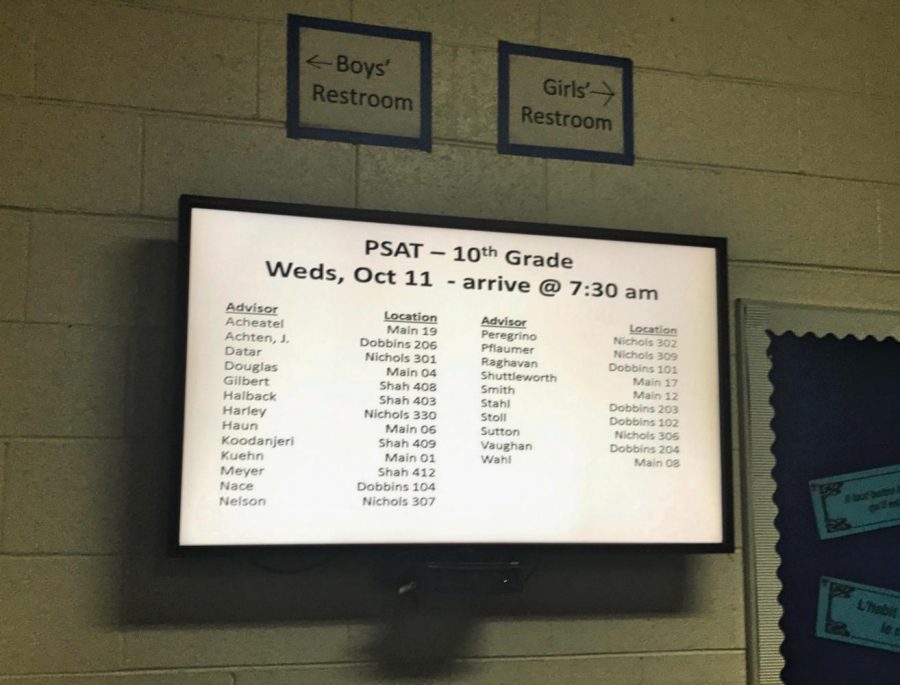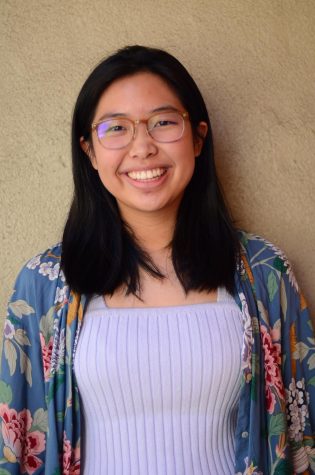Juniors and sophomores take PSATs
Testing locations were posted on campus monitors. The juniors took the PSAT in the auxiliary gym, while the sophomores tested in their advisors’ classrooms.
October 11, 2017
Juniors and sophomores took the PSAT exam today from 8 to 11 a.m.
Students were required to arrive on campus by 7:30 a.m. Late arrivals were not permitted to take the exam, according to College Board regulations.
Testing locations were posted around the campus. The juniors completed the exam in the auxiliary gym, while the sophomores stayed in their advisors’ classrooms for testing. After the exam, students were free to leave campus for the rest of the day. The kitchen staff provided lunch for those who stayed at school.
Director of standardized testing and scheduling Derek Kameda sent out an email to juniors and sophomores with information about the exam on Sep. 25. For the exam, students were advised to bring #2 pencils and approved calculators. A list of approved calculators, which included scientific, graphing and four-functions devices, were included in the PSAT Student Guide that teachers handed to students in class.
Students prepared for the PSAT using the Student Guide and the included practice test. Some English teachers spent time in class to practice for the exam.
“I did the practice test that they handed [in class]. I also used the SAT practice app, which gives you past SAT questions.” Emma Li (10) said. “SAT [has] new questions every year, so the old questions are free for everyone to use. I used all the questions I got wrong and analyzed which parts I need to focus on.”
For sophomores, the PSAT is a way to practice for future SAT exams or other standardized tests. For the juniors, their scores are sent to and considered for awards from the National Merit Scholarship Program. PSAT scores are not sent to colleges.
“I thought of last year as more of a diagnostic test, so I can gauge how much I needed to improve for this year,” Shreya Dasari (11) said.
Sophomore advisor Lauri Vaughan believes that the skills necessary for doing well on the SATs and PSATs are developed throughout the years and are not limited to the exams.
“I think that the [juniors] who are going to become National Merit Scholars based on their PSAT scores probably would become National Merit Scholars because of the foundation of knowledge built up over the years,” she said. “I don’t think you can study over the weekend to become [a] National Merit Scholarship winner.”
Seniors were excused from school and stayed at home to study and work on college applications, while the freshmen went on a class community service trip to the Coyote Wildlife Reserve.


















![“[Building nerf blasters] became this outlet of creativity for me that hasn't been matched by anything else. The process [of] making a build complete to your desire is such a painstakingly difficult process, but I've had to learn from [the skills needed from] soldering to proper painting. There's so many different options for everything, if you think about it, it exists. The best part is [that] if it doesn't exist, you can build it yourself," Ishaan Parate said.](https://harkeraquila.com/wp-content/uploads/2022/08/DSC_8149-900x604.jpg)




![“When I came into high school, I was ready to be a follower. But DECA was a game changer for me. It helped me overcome my fear of public speaking, and it's played such a major role in who I've become today. To be able to successfully lead a chapter of 150 students, an officer team and be one of the upperclassmen I once really admired is something I'm [really] proud of,” Anvitha Tummala ('21) said.](https://harkeraquila.com/wp-content/uploads/2021/07/Screen-Shot-2021-07-25-at-9.50.05-AM-900x594.png)







![“I think getting up in the morning and having a sense of purpose [is exciting]. I think without a certain amount of drive, life is kind of obsolete and mundane, and I think having that every single day is what makes each day unique and kind of makes life exciting,” Neymika Jain (12) said.](https://harkeraquila.com/wp-content/uploads/2017/06/Screen-Shot-2017-06-03-at-4.54.16-PM.png)








![“My slogan is ‘slow feet, don’t eat, and I’m hungry.’ You need to run fast to get where you are–you aren't going to get those championships if you aren't fast,” Angel Cervantes (12) said. “I want to do well in school on my tests and in track and win championships for my team. I live by that, [and] I can do that anywhere: in the classroom or on the field.”](https://harkeraquila.com/wp-content/uploads/2018/06/DSC5146-900x601.jpg)
![“[Volleyball has] taught me how to fall correctly, and another thing it taught is that you don’t have to be the best at something to be good at it. If you just hit the ball in a smart way, then it still scores points and you’re good at it. You could be a background player and still make a much bigger impact on the team than you would think,” Anya Gert (’20) said.](https://harkeraquila.com/wp-content/uploads/2020/06/AnnaGert_JinTuan_HoHPhotoEdited-600x900.jpeg)

![“I'm not nearly there yet, but [my confidence has] definitely been getting better since I was pretty shy and timid coming into Harker my freshman year. I know that there's a lot of people that are really confident in what they do, and I really admire them. Everyone's so driven and that has really pushed me to kind of try to find my own place in high school and be more confident,” Alyssa Huang (’20) said.](https://harkeraquila.com/wp-content/uploads/2020/06/AlyssaHuang_EmilyChen_HoHPhoto-900x749.jpeg)







